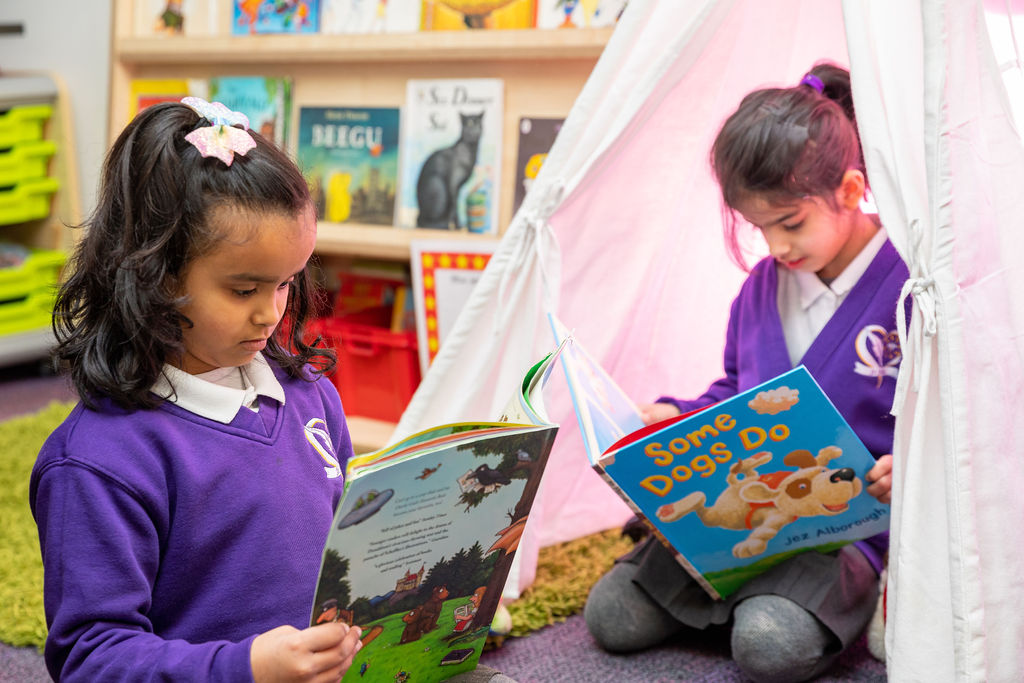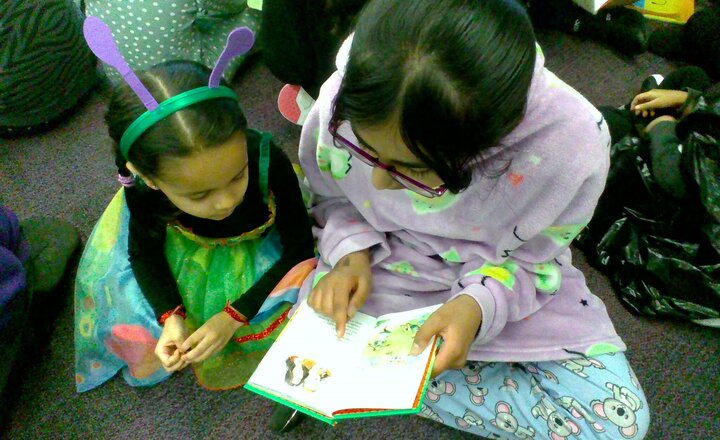Why do we teach English?
English
A child’s understanding of reading and writing are essential skills; not just in their development in English but they are key to our children having the skills to access all areas of the curriculum.
Writing
.jpg)
At St Silas we believe that all pupils should be able to confidently communicate their knowledge, ideas and emotions through their writing. We want pupils to acquire a wide vocabulary, a solid understanding of grammar and be able to spell new words by effectively applying the spelling patterns and rules they learn throughout their time in primary school. We want them to write clearly, accurately and coherently, adapting their language and style in and for a range of contexts, purposes and audiences. We believe that all pupils should be encouraged to take pride in the presentation of their writing, in part by developing a good, joined, handwriting style by the time they move to high school. We believe that all good writers refine and edit their writing over time, so we want children to develop independence in being able to identify their own areas for improvement in all pieces of writing, editing their work effectively during and after the writing process. We do not put ceilings on what pupils can achieve in writing and we do not hold pre-conceptions about any pupils’ ability to make progress. We understand the importance of parents and carers in supporting their children to develop both grammar, spelling and composition skills, and so we want to encourage a home-school partnership which enables parents and carers to understand how to enhance the skills being taught in school.
Reading

At St Silas, we believe that all pupils should have the opportunity to be fluent, confident readers who are able to successfully comprehend and understand a wide range of texts. We want pupils to develop a love of reading, a good knowledge of a range of authors, and be able to understand more about the world in which they live through the knowledge they gain from texts. By the end of their time at primary school, all children should be able to read fluently, and with confidence, in any subject in their forthcoming secondary education. We understand the importance of parents and carers in supporting their children to develop both word reading and comprehension skills, and so we want to encourage a home-school partnership which enables parents and carers to understand how to enhance the skills being taught in school through good quality texts.
How do we teach English?
The children at St Silas have an English lesson taught on a daily basis. In Early Years and Foundation Stage and Year 1, Read Write inc Phonics forms the structure for the children’s English lessons. For detailed information on Read Write inc, please refer to the Phonics page of Curriculum area of this website. When children have attained their Phonics screening, they receive a tailored English curriculum. This is designed to provide our pupils with the skills required for their continued progression In Key Stage 2, with increasing formality, to prepare the children for the transition to Year 3. In Year 2 and Key Stage 2, our children follow the Lancashire Primary English Curriculum. Each unit of work is developed using a teaching sequence to meet the reading, writing, spelling and grammar needs of the children. A range of texts and vocabulary around the chosen topic will then be explored with a focus on children’s English targets at both group and individual level. A range of books will be explored to model a range of genres, writing styles, grammatical structures and use of vocabulary. The children engage in a range of activities to capture ideas for their writing outcome. Specific grammar and punctuation skills are taught before being applied in the writing process. Children are expected to edit and improve their work and apply the skills taught in English across the range of curriculum subjects and opportunities for independent writing are incorporated into planning on a weekly basis.
Reading
In EYFS and Year 1 the acquisition of reading is incorporated in the Read Write inc Phonics program. When the children have passed the phonics screening, they progress on to individual reading books following the Oxford reading scheme. Each child receives a number of home reading books that are changed regularly. The level of each child is continually assessed by their class teachers to ensure a tailored learning experience. In addition to the daily English lesson children in Year 2 and Key Stage 2 also participate in a 20 minute guided reading session where they develop reading accuracy, inference and comprehension skills. Each week the children develop their vocabulary supported by the text; there is a focus on the key skills of retrieval, inference, summarising, explanation and prediction.
Spelling, Punctuation and Grammar
Children in Key Stage 2 are taught spelling using Spelling Shed and are given spellings to learn weekly as part of their homework. Grammar and punctuation skills are taught within the daily English lesson and children are given opportunities to apply their knowledge when writing for different outcomes. We have a wide range of books in our school library and each class is timetabled weekly to visit and change library books. Children are able to use the library during lunchtimes and parents are invited to use the library with their child after school. We ensure that every child has the opportunity to join the local library in Blackburn.
Handwriting
There are regular timetabled slots for handwriting to ensure that children build up their handwriting skills every day. We make the physical process of writing-handwriting- enjoyable from the start, so children see themselves as 'writers'. We use mnemonics-memory pictures- to help the children visualise the letter or join the letters before they write it down. Children need to practise handwriting under the guidance of a teacher so they do not develop habits that will be difficult to undo later.
There are three handwriting stages.
Stage 1a: Children practise correct letter formation.
Stage 1b: Children learn where to place the letters on the writing line.
Stage 2: Children learn a mature style of writing that will lead to joined-up writing.
Stage 3 : Children learn the two basic joins: the arm join(diagonal) and the washing line join(horizontal) and the two variables for each join.
English
What do we teach?
English Objectives for each year group
Assessment
Our children are continually assessed to ensure that our curriculum meets their needs and that they are challenged in their learning.
As the children are working on the Read Write inc program, they are assessed every six weeks to track their progress towards the Phonics screening. After this, the children are assessed termly, completing NFER reading tests. Their writing is continually assessed through the independent writing that they produce. Spellings are tested weekly. This robust and varied assessment ensures that our teachers are continually adapting our provision to the needs of our children.
Message from the Subject Leader
I am passionate that all children should be given the opportunity to access a quality curriculum that is tailored to their individual needs. English is essential in the learning journey of our children, as it is the key to their ability to access all other curriculum areas. With this in mind I have worked tirelessly in ensuring that our English curriculum is right for our children. Mr Hadwin.
Support for Parents
Read Write inc Phonics -
Supporting Reading -
- https://www.readingrockets.org/blogs/shanahan-literacy/11-ways-parents-can-help-their-children-read
- https://literacytrust.org.uk/parents-and-families/
- https://www.booktrust.org.uk/books-and-reading/tips-and-advice/reading-tips/
Supporting Writing -
- https://www.greatschools.org/gk/articles/tips-to-support-writing-at-home/
- https://www.teachwriting.org/blog/2020/3/22/how-parents-can-help-with-writing-at-home
- https://www.scholastic.com/parents/kids-activities-and-printables/activities-for-kids/reading-and-writing-ideas/5-easy-ways-to-support-writing-home.html
Supporting Spellings -


.jpg)

